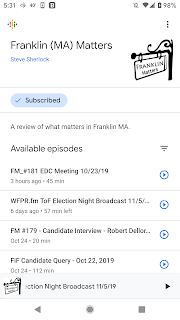Friday, November 22
9:00am
10:00am
10:30am
7:00pm
7:00pm
7:00pm
7:30pm
Saturday, November 23
10:00am
10:00am
1:00pm
2:00pm
7:00pm
7:00pm
7:00pm
7:30pm
Sunday, November 24
1:00pm
2:00pm
2:00pm
7:00pm
Monday, November 25
10:30am
3:30pm
7:00pm
Tuesday, November 26
9:30am
10:30am
7:00pm
7:00pm
Wednesday, November 27
10:30am
2:00pm
6:30pm
7:00pm
8:00pm
Thursday, November 28
8:00am
For the interactive version, please visit
For the Town of Franklin Public Meeting Calendar
https://www.franklinma.gov/calendarSubmit an event for the Community Calendar, please use this link
 |
| Upcoming Events in Franklin, MA: FRI - Nov 22 to THU - Nov 28 |





